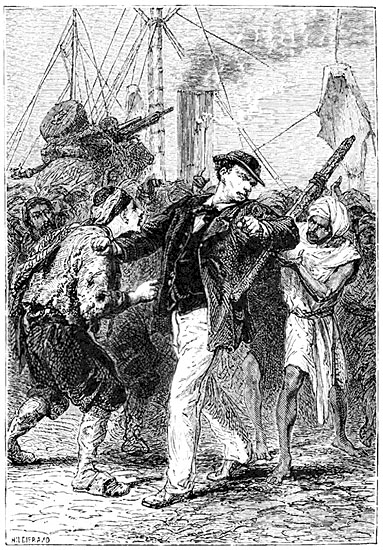 |
| Illustration from a French edition of the book (Gutenberg) |
Note: Travel along with the delightful story of an English gentleman's bet that he can circle the globe in "just" 80 days--in 1872!
Get Ready: Do you enjoy travel? Or would you like to? Where have you been? Where do you want to go? Would you ever like to circle the world?
Imagine a time when no one could travel any faster than the gallop of a horse. Then, suddenly, new inventions made it possible for the average traveler to move much faster--railway trains, for example, and, later, automobiles.
Such was the excitement in the late 19th century, and it inspired Jules Verne's adventure novel, Around the World in Eighty Days. In it, a British gentleman, Phileas Fogg, accepts a bet of 20,000 pounds (over three million dollars today) from the members of his club that he cannot circumnavigate the globe in the allotted time.
The argument was inspired by the news that a new section of railway had opened in India; a few years earlier, the Transcontinental Railroad had opened in America, and the Suez Canal had connected the Mediterranean Sea to the Red Sea and thus the Indian Ocean, obviating the need for ships to sail around Africa to travel between Europe and Asia.
Fogg puts up his 20,000 pounds--half of his fortune--and takes along the rest to cover expenses for himself and his French valet, Passepartout (whose name can be interpreted as "a passport to everywhere"). They leave at 8:45 p.m. on October 2, 1872, and must return by the same time on December 21 (coincidentally, the winter solstice).
They reach Suez on time, having traveled by land and sea. Despite the many images to the contrary, Verne's voyagers never traveled by hot air balloon; that detail was added in a 1956 film, and ironically has become one of the strongest symbols of the story.
In addition to the pressure of the clock, Fogg and Passepartout face another challenge: a Scotland Yard detective named Fix has mistaken Fogg for a bank robber, and boards the steamer the travelers are taking to Bombay. Fogg has offered the steamer's engineer a bonus for arriving in Bombay early, and they do indeed arrive two days ahead of schedule.
Many adventures ensue. For example, the railway across India had not in fact been completed, and Fogg and his valet must travel by elephant. Along the way, they rescue a young widow who was about to practice the ancient Indian custom of suttee--throwing herself on her deceased husband's funeral pyre. They take the woman, Aouda, along with them.
On a layover in Singapore while traveling from Calcutta to Hong Kong, Fix has Fogg and Passepartout arrested, but they escape. When they reach Hong Kong, Fix causes more trouble, and Fogg misses his steamer to Yokohama, though Passepartout makes it. He manages to get a smaller boat to Shanghai, and from there reaches Yokohama to search for Passepartout.
They sail across the Pacific to San Francisco, and as they cross the U.S. by train, they meet more mischief--bison on the tracks, a failing bridge, even an Indian ambush. From New York, they sail for France--until Fogg bribes the crew to mutiny and take him to Liverpool, England. When they run out of fuel, they burn parts of the boat to keep it under steam and fulfill their deal with Fogg.
Once in England, Fix is able to produce a warrant and arrest Fogg, who is cleared when they learn that the real robber has been caught. But the delay makes Fogg miss his deadline by five minutes--or so he thinks.
He has forgotten that he crossed the International Date Line, and is in fact a day early! Oh, and he marries Aouda.
--------Read more: https://en.wikipedia.org/wiki/Around_the_World_in_Eighty_Days
Practice: Match the term to its definition below:
- bison
- circumnavigate
- deadline
- layover
- mischief
- mutiny
- obviating
- valet
- warrant
- widow
- manservant
- overthrow the captain
- surviving wife
- pause in a journey
- travel all the way around
- arrest document
- time limit
- making unnecessary
- trouble
- American buffalo
Answers are in the first comment below.
Submitted to the Shenzhen Daily for May 3, 2021


Answers to the Practice: 1. j; 2. e; 3. g; 4. d; 5. i; 6. b; 7. h; 8. a; 9. f; 10. c
ReplyDelete